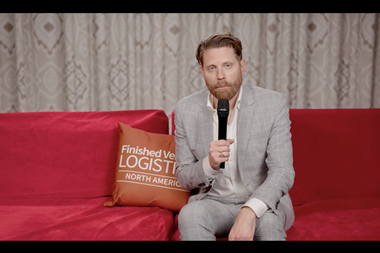
PSA’s Guy Lederer is responsible for linking the carmaker’s parts supply chain from one continent to another, including engineering for packaging, material flow and global platforms, as well as focus on parts ordering and forecasting. Lederer manages a team of about 100 employees that are at the forefront of PSA’s transition from being a predominantly French and European carmaker into one with major operations and material exchanges across Europe and Russia, Asia and South America. The team works closely with global plants as well as with Gefco, the logistics arms of the PSA Group, which sometimes has operations in countries ahead of PSA (which was the case in Shanghai, for example).
Lederer, a native of Strasbourg on the Franco-German border, has a background in mechanical engineering and joined PSA 13 years ago. He is passionate about globalisation and is excited by China in particular, however he also enjoys the local pleasures of the region where he lives close to Paris, including mountain biking.
Christopher Ludwig: When did you first get involved in logistics?
Guy Lederer: I have a research background including a PhD in mechanical engineering. I joined PSA 13 years ago on engineering questions, and switched to industrial affairs around eight years ago. That began with China–a country that I would call a great friend of mine–where we worked on doubling capacity for our [joint venture] plant in Wuhan. Soon after that, we worked on completely reengineering the logistics flows from Europe to China. My second role in logistics was supplier capacity management particularly related to diesel engines, including both forecasting parts supply and also crisis management for when there was a shutdown or shortage. I’m in my current position for two years.
CL: What do you find most exciting about logistics?
GL: What I like about it is that nothing is particularly complicated in itself–fundamentally you just have to push carton boxes–but you have such a tremendous amount of simple tasks to do that it becomes very complex, which I find to be exciting. Also, the global nature of the job is of major interest to me, both in terms of the operations as well as the management. Because the tasks are not complicated but complex, you have to be focused on who does what in the supply chain, which means that clear management from a human point of view is crucial.
CL: What do you find to be most challenging thing about logistics?
GL: Information management still seems to me to be much too complicated. I believe there is a lot we could do to make this simpler. Another thing that had been frustrating but happily has now changed was the consideration of logistics. Today, logistics is no longer the afterthought that follows stamping, welding, etc. Now, from the onset of major projects, we are talking about the architecture of the flows and the ways of ordering vehicles and parts from the sales department. It is an important change.
CL: What sort of things do you like to do outside of work?
GL: I like to spend time with my children. I also love to bicycle. I am lucky to live close to a nice forest near to Paris, so I quite enjoy my VTT [vélo-tout-terrain, mountain bike].
CL: What are your top goals this year?
GL: My goal is to continue to build a worldwide team regarding our intercontinental flows, including the integration of people from China and South America into our European base so that all of our exchanges are fluid and competitive. We are also in the middle of important cost reduction projects, alongside our new projects in Russia and our new joint venture in China.


























![Global[1]](https://d3n5uof8vony13.cloudfront.net/Pictures/web/a/d/s/global1_726550.svgz)









